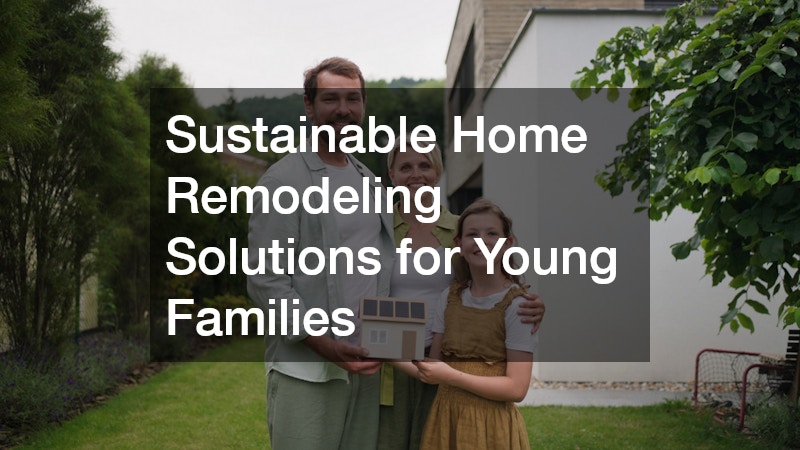Sustainable home remodeling has become an essential consideration for young families looking to create homes that are not only beautiful but also environmentally responsible. With growing awareness of climate change and energy conservation, homeowners are seeking ways to make renovations that reduce their carbon footprint while maintaining style and functionality. By incorporating eco-friendly practices, families can build homes that support both their lifestyle and the planet.
For young families, sustainable home remodeling is about balancing immediate comfort with long-term benefits. From energy-efficient appliances to durable materials, each choice contributes to a more responsible way of living. Thoughtful planning ensures that the home meets current needs while remaining adaptable for future expansions or modifications.
One of the critical aspects of sustainable home remodeling is energy efficiency. Upgrading heating, cooling, and lighting systems can significantly reduce energy consumption, lowering utility bills while minimizing environmental impact. Young families often prioritize these upgrades to create a safe and efficient environment for children.
Another important consideration is the use of sustainable materials. Wood, recycled metals, and low-VOC paints can replace conventional materials that contribute to pollution. These choices not only enhance the indoor air quality but also ensure that the home is built with longevity in mind. Additionally, using materials that are durable and easy to maintain can help reduce waste over time, contributing to a sustainable lifestyle.
Sustainability in home remodeling is also about resource conservation. It’s important to think about water usage and how to implement water-saving appliances, fixtures, and systems throughout the home. By doing so, young families can significantly reduce water waste and lower their environmental impact.
Furthermore, sustainable home remodeling often involves embracing renewable energy sources, like solar panels, which allow families to decrease their reliance on traditional utilities. This can lead to significant savings on energy bills and create a more resilient and self-sufficient home.
Ultimately, sustainable home remodeling is about making conscious decisions that help reduce waste, use fewer resources, and promote healthier living spaces. This article will explore several key solutions that young families can implement when remodeling their homes, including solar panel installation, kitchen remodeling, and other green improvements.
Installing Solar Panels

One of the most impactful upgrades in sustainable home remodeling is solar panel installation. As energy costs rise and concerns about fossil fuels increase, solar panels provide an excellent way to reduce dependency on traditional energy sources. Installing solar panels on your home can significantly decrease your energy bills, increase the value of your property, and reduce your household’s carbon footprint.
Solar energy is renewable, clean, and abundant, making it an ideal option for homeowners looking to invest in long-term sustainability. For young families, solar panels offer a cost-effective solution to reducing energy consumption, which is particularly helpful as families grow and energy needs increase. Moreover, many governments offer tax incentives and rebates for those who install solar panels, making this investment even more affordable.
When planning for solar panel installation, it’s essential to work with professionals who can evaluate the best system for your home based on its location, roof size, and energy usage. This ensures that you get the maximum benefit from your solar panels, both in terms of efficiency and savings. Professionals will also be able to guide you on battery storage solutions, which can help ensure that your home continues to be powered by solar energy even when the sun isn’t shining.
Another great benefit of solar panel installation is that they help reduce your reliance on the grid. With solar panels, you can generate your own electricity, making your home more energy-independent. For young families, this can provide peace of mind, knowing that they can maintain a steady power supply even during outages or emergencies.
Furthermore, the installation of solar panels can add significant value to your home. Studies have shown that homes with solar panels sell faster and for higher prices compared to those without. As more buyers look for energy-efficient homes, the demand for properties equipped with solar technology is likely to continue to rise.
Remodeling Your Kitchen
The kitchen is often considered the heart of the home, and it’s also one of the most significant areas for energy consumption. Sustainable home remodeling in the kitchen focuses on upgrading appliances, improving energy efficiency, and choosing environmentally friendly materials. For young families, a sustainable kitchen remodel can help reduce waste, increase energy savings, and create a healthier living environment.
Energy-efficient appliances, such as refrigerators, dishwashers, and ovens, can drastically reduce electricity usage without sacrificing performance. Choosing appliances that have Energy Star certification is a smart way to ensure that you’re investing in products that are both environmentally responsible and cost-effective. These appliances use advanced technology to consume less energy while performing just as well, if not better, than their non-efficient counterparts.
In addition to appliances, sustainable materials for countertops, cabinets, and flooring can further reduce the environmental impact of a kitchen remodel. For instance, recycled glass or bamboo countertops are both durable and eco-friendly, while low-VOC paints and finishes can improve indoor air quality by reducing harmful chemicals. Choosing locally sourced materials can also help reduce your environmental footprint by cutting down on transportation emissions.
Another key component of sustainable kitchen remodeling is reducing food waste. Installing composting systems or choosing appliances like garbage disposals that allow for organic waste to be recycled can significantly minimize the amount of waste sent to landfills. This not only benefits the environment but also helps in maintaining a cleaner, more organized home.
Moreover, incorporating smart technologies in the kitchen, such as smart lighting and smart refrigerators, can further enhance the sustainability of the space. These technologies help to monitor and reduce energy consumption, ensuring that your kitchen operates at maximum efficiency.
Choosing an Electric Fireplace

Incorporating an electric fireplace into your sustainable home remodeling plan is a great way to add warmth and ambiance without relying on traditional heating methods. Electric fireplaces are energy-efficient and emit fewer emissions compared to wood-burning or gas models, making them an eco-friendly choice for heating.
Electric fireplaces use modern technology to mimic the appearance of a real fire while providing heat with little energy consumption. They are easy to install, require minimal maintenance, and come in a variety of styles and sizes to fit any room in the house. For young families, electric fireplaces are a safe alternative to traditional heating methods, as they eliminate the risk of open flames or gas leaks.
Another great benefit of electric fireplaces is their ability to offer both heating and decorative features without the need for a chimney or venting system. This makes them a great option for homes that may not have the infrastructure for traditional fireplaces. Moreover, electric fireplaces are extremely efficient, as they only consume energy when in use, and can be easily turned off when no longer needed.
By installing an electric fireplace, you can create a cozy, sustainable living space while reducing your household’s overall energy usage. With the added benefits of aesthetic appeal and safety, electric fireplaces are an excellent choice for families seeking eco-friendly home improvements.
Choosing a Granite Kitchen Countertop
When it comes to choosing countertops for your kitchen, sustainability is an important factor to consider. Granite is a natural stone that is durable, long-lasting, and requires minimal maintenance, making it an excellent choice for sustainable home remodeling. Although the extraction of granite does have some environmental impact, it is a highly durable material that can last for decades, reducing the need for frequent replacements.
Granite kitchen countertops can also increase the value of your home, making them a smart investment for young families who plan to stay in their home for many years. The material is resistant to scratches, stains, and heat, making it perfect for high-traffic areas like the kitchen.
For those looking to reduce their carbon footprint even further, consider sourcing granite from local suppliers or manufacturers that prioritize eco-friendly production practices. This can help reduce transportation emissions and support local businesses that focus on sustainable practices.
Furthermore, granite’s natural beauty and versatility make it a timeless choice for any kitchen. It comes in various colors and patterns, allowing homeowners to find the perfect match for their space. Whether you prefer a polished or matte finish, granite countertops offer a sustainable and stylish solution for your kitchen remodel.
Choosing Wooden Cabinets

Wooden cabinets are a staple in many kitchens, bathrooms, and living areas, but choosing the right materials is crucial when remodeling for sustainability. Opting for cabinets made from sustainably sourced wood ensures that your remodeling project supports responsible forestry practices.
Work with a wooden cabinet contractor who specializes in eco-friendly materials and can provide certifications for sustainably sourced wood. Look for cabinets made from reclaimed wood or FSC-certified (Forest Stewardship Council) timber, which ensures that the wood has been harvested in a way that minimizes environmental impact.
In addition to the material choice, consider low-VOC or no-VOC finishes and paints for your cabinets to reduce harmful emissions in your home. Sustainable cabinets not only look beautiful but also contribute to a healthier indoor environment and a lower carbon footprint.
Wooden cabinets are not only a sustainable choice but also provide a natural, timeless aesthetic. Whether you prefer a rustic or modern design, wooden cabinets can elevate any space while supporting sustainability.
Upgrading Your Flooring
The flooring choices you make during your home remodeling can have a significant impact on the environment. Sustainable flooring options, such as bamboo, cork, and reclaimed wood, offer environmentally friendly alternatives to traditional hardwood floors. These materials are renewable, durable, and often require less energy to produce, making them an excellent choice for families looking to reduce their environmental footprint.
Bamboo, for example, is a rapidly renewable resource that can be harvested in just a few years, unlike traditional hardwoods, which can take decades to grow. Cork is another great sustainable option, as it is made from the bark of cork oak trees, which naturally regenerate after harvesting.
When shopping for flooring, look for stores that specialize in eco-friendly materials and offer a range of sustainable options. These stores can guide you in choosing the best flooring for your home’s needs, helping you create a beautiful, eco-conscious space.
Repairing Your Water Heater
Hot water is essential for everyday living, but traditional water heaters can be energy-hungry. Sustainable home remodeling includes investing in energy-efficient water heaters that provide hot water with minimal energy use. Tankless water heaters, for example, heat water on demand, eliminating the need for a large storage tank and reducing energy waste.
If your home currently has an older water heater, consider scheduling local water heater repairs to increase its efficiency. In some cases, simple repairs or upgrades, such as adding insulation or replacing old components, can extend the life of your water heater and improve its energy efficiency.
By opting for energy-efficient water heating solutions, you can reduce your household’s energy consumption and lower your utility bills while ensuring that your home remains comfortable for your family.
Hiring an Electrician

When remodeling your home with sustainability in mind, it’s important to work with electrician companies that specialize in energy-efficient solutions. These professionals can help you upgrade your electrical system to support modern, eco-friendly appliances and technologies.
For instance, electrician companies can install energy-efficient lighting systems, smart thermostats, and outlets that are optimized for low-energy consumption. They can also help you integrate solar power into your home by ensuring that your electrical system is compatible with solar panels, electric vehicles, and other renewable energy sources.
By hiring an electrician who is knowledgeable about sustainable practices, you can ensure that your home’s electrical system is designed to be both energy-efficient and future-proof.
Working With an HVAC Company
Heating, ventilation, and air conditioning (HVAC) systems play a crucial role in creating a comfortable and energy-efficient home. Sustainable home remodeling includes upgrading your HVAC system to improve energy efficiency, reduce emissions, and lower your utility costs. Modern, energy-efficient HVAC systems use less energy to heat and cool your home, which translates into both financial and environmental savings.
Regular HVAC service is essential to ensure that your system continues to perform at its best. During service appointments, HVAC technicians can clean ducts, replace filters, and inspect the system for any issues that may reduce efficiency. An efficient HVAC system not only reduces your energy consumption but also helps maintain a healthy indoor air quality, which is essential for young families.
Maintaining Your AC System
For families living in warmer climates, air conditioning is an essential part of the home. Sustainable home remodeling includes regular AC maintenance to ensure that your system is running as efficiently as possible. A well-maintained air conditioning unit uses less energy and operates more effectively, reducing both your carbon footprint and your energy bills.
Scheduled AC maintenance includes cleaning the coils, checking refrigerant levels, and replacing air filters to improve airflow. It’s also an opportunity for technicians to inspect the system for potential issues, preventing costly breakdowns and extending the life of the unit.
By prioritizing regular AC maintenance, young families can create a comfortable and energy-efficient living space that contributes to a healthier home environment.
Creating a Green Home
Sustainable home remodeling offers a wide range of benefits for young families, from reducing environmental impact to saving money on utility bills. By incorporating green practices such as solar panel installation, energy-efficient appliances, and eco-friendly materials, families can create homes that are not only functional but also environmentally responsible.
When remodeling, it’s essential to choose sustainable options that align with your family’s needs. Solar panel installation services, kitchen remodeling, and electric fireplaces are just a few of the upgrades that can enhance your home’s energy efficiency and sustainability. Working with local contractors, flooring stores, and HVAC service providers who specialize in green solutions ensures that your remodeling project supports both your home and the environment.
As young families grow and change, sustainable home remodeling allows for flexibility and adaptability. By making eco-conscious choices today, families can enjoy long-term benefits, reduce their carbon footprint, and contribute to a healthier planet for future generations.
Sustainable home remodeling not only creates a more efficient and eco-friendly living environment but also provides peace of mind. By making thoughtful, sustainable choices, young families can ensure that their homes are both comfortable and resilient to future environmental challenges. Whether it’s through energy-efficient systems, sustainable materials, or renewable energy sources, each step taken toward sustainability is a step toward a healthier home and planet.
Furthermore, sustainable remodeling can be a powerful legacy to leave for future generations. As young families make environmentally conscious decisions, they are not only improving their immediate living conditions but also setting a positive example for others. By embracing green home improvements, families are contributing to a broader cultural shift toward sustainability, ensuring that their homes remain functional, energy-efficient, and adaptable for years to come.


